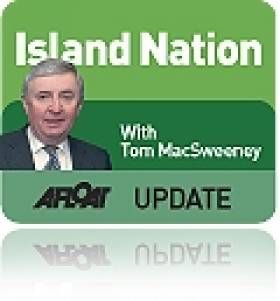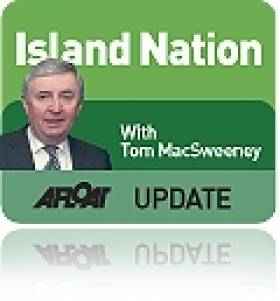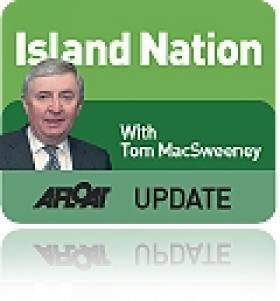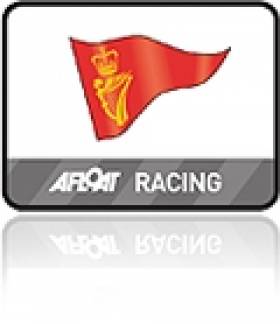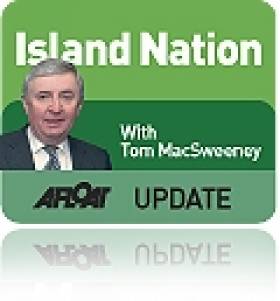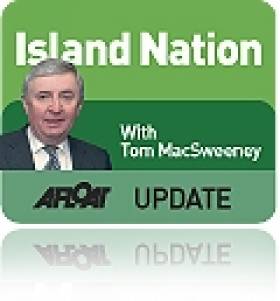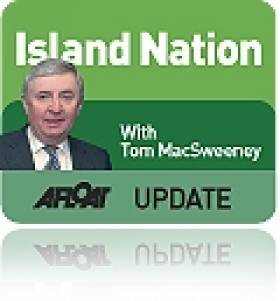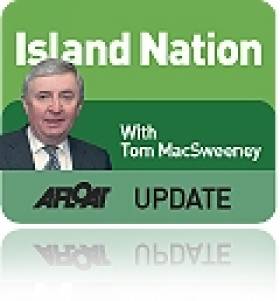Displaying items by tag: Tom MacSweeney
Giving Away a Billion from the Sea
I had to read the figures twice to make sure that I was seeing them correctly. The second reading made me even more angry than the first.
They were, at last, a definitive figure of how much the stupidity of Irish politicians and the ignorance and disregard of the maritime sphere by the Government have cost this nation – over a billion Euros in one year.
There is no way the Government can weasel its way out of this revelation, nor any excuse the un-named civil servants responsible can make to avoid the accusation that this is a massive economic waste.
The Marine Institute is the Government's own respected authority on maritime affairs, the voice of the State on marine research and it has valued the total available catch of fish off Ireland last year at €1.18 billion, for a total of 994,155 tonnes.
That is an enormous figure, indicating huge potential wealth for this cash-strapped nation in the middle of an economic disaster. But of this total value of seafood, Ireland was only entitled to catch €0.19 billion. Foreign fishing fleets had exclusive rights to take the rest of the fish from Irish waters.
No wonder I had to read the figures a second time to make sure I was seeing them correctly at a time when the value of our food exports has been shown to be one of the top earners for the nation. How much more could have been earned if Irish fishermen could catch all that fish and have it processed in Ireland, creating onshore jobs in ancillary businesses as well as at sea?
The total value for 2010 could be even higher than €1.18 billion because the Institute prepared its figures in advance of the annual fisheries negotiations in Brussels in December. Ireland as a nation and the country's fishing industry in particular are likely to have lost out even more heavily to other EU countries.
Effectively, Ireland handed over around €1billion of its natural economic resources to other EU countries. Mark McCarthy, Editor of The Marine Times, the national fishing industry paper, described the figures as "truly frightening."
"This is a nation with some of the richest fishing grounds in the world where the coastal communities are being financially starved and frustrated through their inability to catch their own fish, because they are not allowed to do so."
It is hardly any wonder that Irish fishermen, forced to tie up their boats at the quaysides of Irish fishing ports and watch as foreign vessels unload into those ports, are bitter and frustrated.
Ebbie Sheehan of Castletownbere, Chairman of the Irish Fishermen's Organisation, asks why fishermen are "so badly treated when we look at the economic situation today?"
The Marine Institute, our national maritime scientific and research organisation, says that its estimate of the value of fishing opportunities in Irish waters is "conservative" and that, in order to prepare the figures in early December, it based them on 2009 values
That would make the total value even higher and the Institute pointed out that of the total catch of 994,155 tonnes, Ireland's fishermen were entitled to take only 18 per cent of the catch. This was only 16 per cent of the total value.
"These figures exclude valuable inshore fisheries, such as lobster and whelk which are not currently managed by total allowable catches within the Common Fisheries Policy," the Institute pointed out.
As Mark McCarthy described it, when one considers the importance of using our natural resources for the benefit of Irish people and the failure of our political leaders to see and understand this, what has been revealed is "truly frightening".
- This article is reprinted by permission of the EVENING ECHO newspaper, Cork, where Tom MacSweeney writes maritime columns twice weekly. Evening Echo website: www.eecho.ie
National 18s -72 Years Old and Still Sailing
My first experience of racing was in a National 18 wooden dinghy and it was rough. Inexperienced as a crewman during a race in Monkstown Bay, I slit the top of a finger across a chain plate while pulling in the headsail sheet.
Blood started to pour out of the cut. With the dinghy having only a short freeboard I did what seemed best. To avoid getting blood on the sail which is a heinous crime aboard sailing boats, I put my hand in the water to wash away the blood.
A roar from astern heralded the Skipper's response:
"Get your b....hand out of the water, you're causing drag," which meant I was being accused of the crime of slowing the boat down in a race where there was little wind and every bit of forward momentum was important.
I began to explain and made the mistake of asking where I should put my bloodied finger!
The answer is not printable, but taught me that National 18s didn't take competitive sailing lightly.
I grew to love those boats, their beautiful lines, their speed and their demands on the crew with a spinnaker up. Inevitably, with the cost of maintaining wooden boats, the glass fibre boats (GRP), took over, but the National 18 Class kept going, primarily based in Crosshaven.
Then the 1720s arrived, named after the year when the Royal Cork Yacht Club was founded, powerful new boats which were predicted to wipe out the National 18s. They didn't. Despite becoming very popular for a time, their support declined and the National 18s continued, not alone surviving, but strengthening
This week the Class has announced that it intends to host "the largest gathering of National 18s in the history of this legendary boat."
Next year's Class Championships, better known as the Cock O' the North and sailed in alternative years in Ireland and the UK, where the National 18 is also popular, will be held in Crosshaven from July 24 to 29.
"We are calling on everyone interested to get in touch and take part in what is going to be a great occasion, whether you are a former 18 sailor or someone looking for a new challenge," Class Captain Peter O'Donovan told me. "We are putting in a big effort to get former 18 sailors and their boats back on the water."
It is hoped that at least 50 boats will take part "and perhaps even more," said Peter who has been trawling class records to find former owners and boats which will be arranged in three divisions for the event.
"We decided to include a Classics section, which will encourage those who owned the beautiful wooden, clinker boats, to sail again with us. Some of these boats have reappeared in Crosshaven, we know of others in West Cork and further afield," said Peter.
There will be a section for the "Penultimates," the older fibreglass 18s which "have been hiding in garages, just waiting to be taken out again" and the "Ultimates," the modern fibreglass boats at the front of the present fleet.
"We want to make this a special event and so far there has been interest from Schull, Baltimore, Waterford, Wexford, Arklow and Lough Derg. Further afield, we expect to see visitors from Scotland, the Isle of Man, Essex, Tamesis and Chichester Harbour and we have even had a request for information from Germany."
One of the famous boat building family in Arklow, James Tyrrell, is amongst those who have owned and sailed a National 18. Another sailor of the boats was Peter Crowley, present Chairman of the Irish Sailing Association.
He sailed with Tommy Dwyer from Monkstown who is regarded as an icon of the National 18 fleet in Cobblerod. Tommy now sails Das Boot.
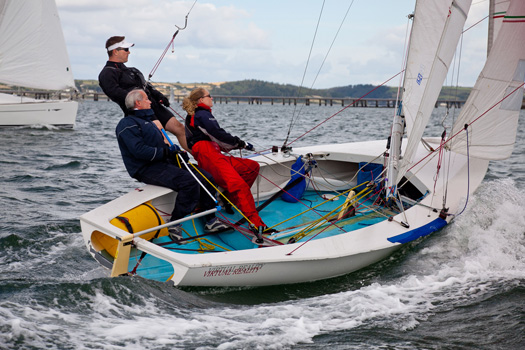
Fun in the National 18. Photo: Bob Bateman
"She was recovered from the bottom of Cork Harbour and I refurbished her. said Tommy, "We named her after the U-boat which featured in the film of that name."Tommy has been sailing National 18s for over 40 years. Every year his name has been amongst the trophy winners.
"For those interested in sailing, we would like to hear from those who would like to crew in the championships," Peter O'Donovan told me. "In addition, we are compiling a list of boats available for charter across the three divisions. For anyone not looking to sail, but just to be part of the event, we will also require assistance with rescue vessels, committee boats and other aspects of the event. It is also hoped to put together a collection of photographs from days gone. We would like to hear from anybody with material. Former 18 sailors who cannot get involved in the event could join us at the Class Dinner and renew acquaintances."
Anyone interested can contact the National 18 class by Emailing Peter O'Donovan at [email protected] or on phone 087 2491720 or Email Kieran O'Connell at [email protected]
The original idea for the building of National 18s was that of Frank Knowling of Whitstable YC in the UK, who later became known as the 'father' of the class. In 1938 he wanted an 18-foot dinghy, suitable for day sailing, yet fast enough to be of interest to racing sailors and at a reasonable cost.
The UK national sailing association and Yachting World magazine organised a design competition won by well-known designer Uffa Fox with a proposal for a clinker-built wooden boat. Another major designer, ¸, had also submitted a proposed boat. The first National 18 was named 'Hurricane,' owned by Stanley Beale and sailed at Whitstable.
It was not until after World War that building of 18s got underway. The Class Association was established in 1947 and by 1950 fleets had appeared at clubs around the coast of Britain and Ireland.
Seventy-two years after the first moves to build National 18s they still survive, a tribute to a great boat.

This article is reprinted by permission of the EVENING ECHO newspaper, Cork, where Tom MacSweeney writes maritime columns twice weekly. Evening Echo website: www.eecho.ie
Remembering Seafarers Who Saved the Nation
City Quay in the centre of Dublin can be a cold place when the wind whips upriver from the open sea.
There was a 'bite' in the wind as I stood there in late November last year, recording the sounds of remembrance. Men, women and children stood in front of a monument where, on most days, traffic pours past and the great majority of people in those vehicles may not realise they are passing a hallowed spot which remembers men without whom this nation would have ground to a halt. This nation may be in a state of "economic war" at present, it was in a real state of war when those men died.
Every year, on the second last Sunday of November, this gathering takes place, when the men of the Irish mercantile marine who lost their lives at sea during the Second World War are remembered. Mass is celebrated in the City Quay Parish Church. Then there is a short walk to the Seamen's Memorial where wreaths are laid. That is followed by tea, coffee and a chat in the parish hall where it is a time of memories for former seafarers and their families. Friendships are renewed as the "family of the sea" gathers. In the afternoon, there is another Memorial Service St. Patrick's Cathedral.
These are poignant occasions which, in recent years, have been extended to embrace, remember and honour all Irish seafarers who have died at sea. The Maritime Institute of Ireland organises the event. Its Cork Branch also holds a remembrance service in November.
The month of November is an important one in the history of Irish maritime affairs.
It was on November 14, 1984 that the then Irish Government, a Fine Gael/Labour Coalition delivered a shattering blow to the Irish maritime industry. They put the national shipping company, Irish Shipping, into liquidation.
Those who took that decision have since put distance between themselves and the maritime sector. Garrett Fitzgerald was Taoiseach; Alan Dukes was the Minister for Finance in the Fine Gael/Labour Coalition Government which made that controversial decision, putting the first Irish State company into liquidation. Seafarers who had rallied to the call to help save the nation when the company was set up in World War Two were abandoned to their fate. Politicians did not want to remember that, at a time when neutral Ireland was being denied vital supplies by warring nations, seafarers saved the nation from disaster. The politicians who ruled the nation in 1984 abandoned them.
Shortly after they abandoned Irish Shipping, the Government was quick to rescue Allied Irish Banks and protect shareholders over the consequences of rash investment in insurance. Banks were more important than seafarers. It seems that not a lot has changed today in the attitude the Government takes towards banks, in comparison with the way it treats the people of this island nation.
• The Annual National Commemoration Services for Irish Seafarers will be held at 11.30 am this Sunday, November 21, in the Church of the Immaculate Heart of Mary, City Quay, Dublin. Wreaths will be laid afterwards at the Irish Seaman's National Memorial on City Quay. There will also be a memorial ceremony of Evensong at 3.15 pm in St. Patrick's Cathedral, Dublin.
• This article is reprinted by permission of the EVENING ECHO newspaper, Cork, where Tom MacSweeney writes maritime columns twice weekly. Evening Echo website: www.eecho.ie
READ MORE ISLAND NATION BLOGS HERE
An Irish Maritime Foundation
I wonder whether there might be interest in forming an Irish Maritime Foundation?
I raise the question having discussed the possibility with those who run the UK Maritime Foundation and whose views about the sea about the sea impressed me when I met them in London. The Foundation traces its history back to 1981 when shipowners, senior retired naval officers and people involved in the financial industry reacted to changes in British Government policy that were regarded as failing to protect the importance of the UK maritime industry. It is a registered charity with the purpose of promoting and raising interest in the maritime sector amongst the public, the media and Parliament. To do so it is involved in assisting development of maritime education, training and research.
The British are a magnanimous people in my view. It was an honour to accept the Desmond Wettern Award from the Foundation. Desmond Wettern was a distinguished UK maritime journalist for over 30 years and the awards were established in his name. This year the Society for Nautical Research joined the awards project.
In responding I used one of my favourite descriptions - "the Family of the Sea," which I have used on radio. It drew a lot of interest from those present. I believe there is a "family of the sea" which spans oceans and seas, linking those who appreciate the sea as essential to human survival.
"Everyone who has an interest in the sea would recognise that there are and will continue to be, increasing pressures on its use and on the exploitation of its finite resources, but also a number of opportunities," according to Rear Admiral Christopher Perry, Chairman of the UK Marine Management Organisation. Those views and others I discussed with some of those amongst the 200 attending the function, who came from various parts of the world. Professor Richard Harding of the Society for Nautical Research which is marking its centenary, expressed this opinion: "There is a disturbing sense of sea-blindness in the British Government, amongst the general public at large and in the media."
There is certainly sea-blindness in our Government and in much of the media, though I am hopeful that there is growing awareness of the importance of the marine sector amongst the general public. If Ireland had an organisation like the Maritime Foundation, I would be very pleased.
• This article is reprinted by permission of the EVENING ECHO newspaper, Cork, where Tom MacSweeney writes maritime columns twice weekly. Evening Echo website: www.eecho.ie
29 Compete in CH Marine Winter League
A very good fleet of 29 cruisers came to the line for the first day of the CH Marine Winter league writes Claire Bateman. The first radio sound to be heard was the familiar voice of Afloat correspondent Tom MacSweeney, who was PRO for the occasion, advising the course to be sailed would 99, sailing Classes One and Two together and Classes 3 and White Sail also together. An equally well known voice came back wondering whether there would be water at one particular mark!!
The sea was flat and there was a fitful wintery sun. In spite of the dire forecast that had been promised, one could have been doing a lot worse than enjoying a race in Cork Harbour.
The course turned out to be a good choice as it is divided into three parts and could be shortened after any one of the three rounds. The wind from the ESB stack at Whitegate was showing north west, Met Eireann report from Roches Point was giving 5 knots from the west and the Race Officer for the Laser fleet was setting a course for a south west wind. It was that kind of day.
It was an off wind start and True Penance with Joe English on spinnaker got the best start with End Game just behind with Jimmy Nyhan trimming the spinnaker, and Bad Company was looking good as well on the shore side. Magnet was throwing all sorts of shapes at the cage but a was bit slow hoisting her spinnaker.
Classes Three and White Sail sailed one round of the course and Classes One and Two got in two rounds. This worked out very well because as the race progressed the tide was getting stronger and this helped the boats to make it out the harbour against the tide so it all jelled very well.
The prize giving followed at which CH Marine presented the competitors with very seasonal and acceptable bottles of wine and boxes of Cadburys Roses and immediately afterwards the threatened rain began to pour down but as this stage the competitors were not bothered as they were ready to go home having enjoyed a great day of racing.
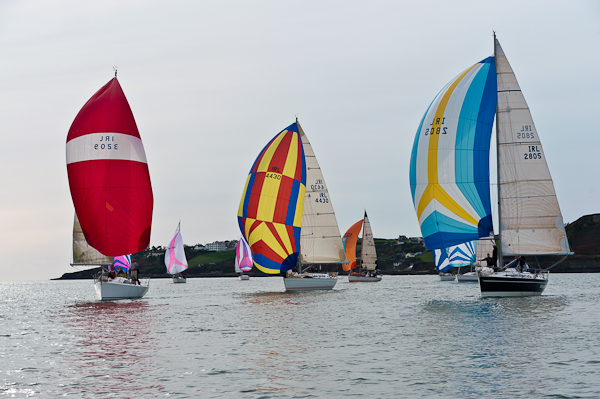
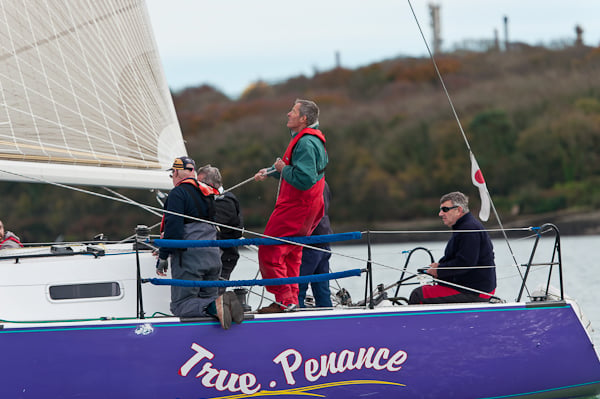
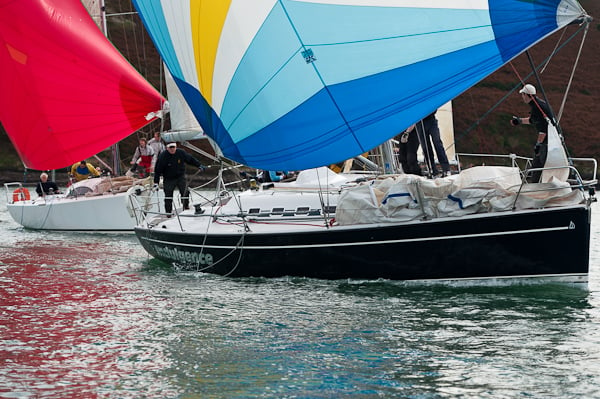
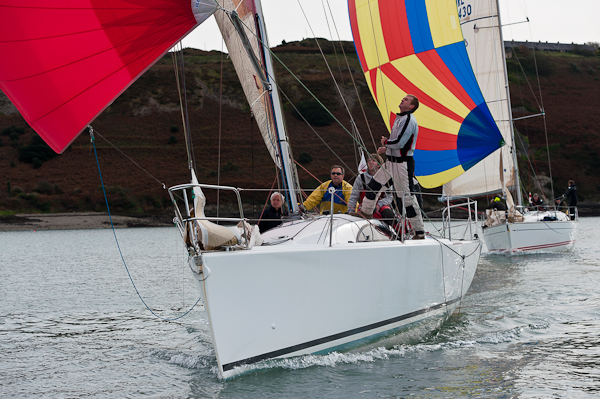
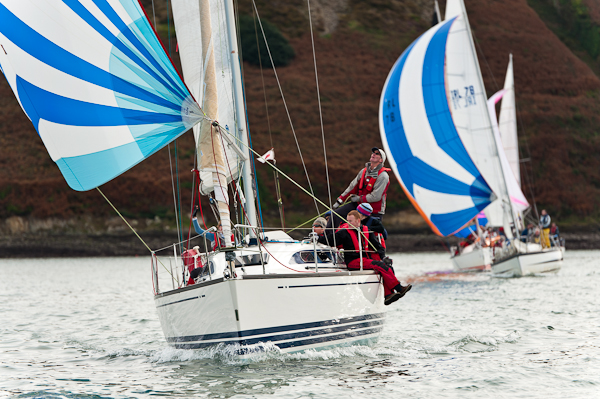
Photos by Bob Bateman
David Harte Sets Another Headline
I have long admired the commitment and dedication to sailing of David Harte in Schull. With his design of the TR 3.6 he has achieved what may well prove to be the ideal boat for team racing. This aspect of sailing is proving very popular amongst younger sailors. In the past few months I have been watching and reporting on the development of the sport by Match Racing Ireland which is now an integral part of the Irish Sailing Association. There is an excitement and enthusiasm which is good for the sport.
Now Schull and David Harte are adding a new dimension with the TR 3.6 which seems a bit like a Firefly when you look at it first, but then there are clear differences in design. The 3.6, a two-person dinghy, is just that in length. "It is robust, cheap to produce and the first boat customised for team racing. This is a boat for people who don't own a boat. It is a boat made for a situation where different crews will be using it and it has to be able to stand up to that pressure. I looked at the concept of the Firefly and then adapted it to what will prove to be a good boat for team racing," David told me.
The boat was shown for the first time at the announcement that Schull will host the ISAF Team Racing World Championships which will be held in the West Cork harbour in 2011. Twenty-four teams from around the world will compete, with the Fastnet Outdoor Education Centre as the base. It has a proven record of success in teaching sailing as a curricular subject at the adjacent Schull Community College which, through the foresight of the Cork County Vocational Education Committee, established this approach several years ago.
David Harte manages the operation. The success of the Schull students in winning the British championships this year, as well as their progress in the sport elsewhere after they leave the college is a testimony to his success.
Next weekend the Irish Team Racing Championships will be held in Schull, with 18 teams from around the country competing "and 40 per cent of the helms will come from Schull," David told me with a satisfied smile, which he deserves to have.
It is intended to raise funding for a fleet of 25 new TR 3.6 boats which Schull will provide for the world championships. Afterwards the boats will remain there, providing more years of sailing for young people. A sponsorship project has been launched and already seven boats have been funded. It is intended to build the boats in Cork and to have the sails made there. The world championships are scheduled to start on Saturday, August 27, 2011.
Photos of the new design afloat HERE
• This article is reprinted by permission of the EVENING ECHO newspaper, Cork, where Tom MacSweeney writes maritime columns twice weekly. Evening Echo website: www.eecho.ie
MacSweeney Receives British Honour for Maritime Journalism Work
For the first time an Irish maritime journalist was honoured by the British Maritime Foundation at its annual awards ceremony in London. The Desmond Wettern Award was presented to Afloat's Tom MacSweeney. It is made to the writer, broadcaster, journalist who in the opinion of the Foundation's Awards Committee has made the most constructive contribution to generating awareness of maritime issues.
The Awards Committee said that the significance of issues chosen, work in radio, television and newspapers and magazines, the range and depth of analysis and impact on public awareness of maritime issues were the reasons for the award to be made to a journalist outside of the UK for the first time.
There was a £1,000 award with the trophy which MacSweeney donated at the ceremony back to the Foundation for support to their work, particularly in the area of tall ships opportunities and sea training for young people. The Foundation will be offering places to Irish people and are interested in extending the work of the Foundation to Ireland.
The Award was presented by Countess Mountbatten, President of the Maritime Foundation at a ceremony in the Institute of Directors building in Pall Mall, London.
Tom MacSweeney is a columnist with Afloat, Ireland's national sailing magazine and Special Correspondent with Ireland's national fishing industry newspaper, The Marine Times. He was formerly Marine Correspondent with RTE, Ireland's national radio and television service and is a former winner of Ireland's maritime person of the year award as well as a maritime author.
TV historian Dan Snow won the Donal Gosling Award for his four-part BBC2 series, Empire of the Seas. This is for the best television, film or radio contribution.
Over 200 celebrities, journalists, business figures and senior naval officers attended this year's Maritime Media Awards, held at the Institute of Directors in London Foundation president Countess Mountbatten of Burma presented prizes to winners of the six categories:
• The Desmond Wettern Media Award for the best journalistic contribution – freelance writer and broadcaster Tom MacSweeney for exemplary coverage of maritime matters
• The Donald Gosling Award for best television, film or radio contribution – Dan Snow, Empire of the Seas
• The Desmond Wettern Fleet award for best media contribution from HM Ship, submarine, Royal Navy Air Squadron or Royal Marine unit – HMS Kent
• The Mountbatten Maritime Award for best literary contribution – Richard Guilliatt and Peter Hohnen, The Wolf
• The Maritime Fellowship Award for an outstanding lifetime contribution in a particular maritime field – Undersea explorer David Mearns
• The Society for Nautical Research Anderson Medal for best contribution to maritime history – Nicholas Black, Head of History, Dulwich College for his book, British Naval Staff in the First World War
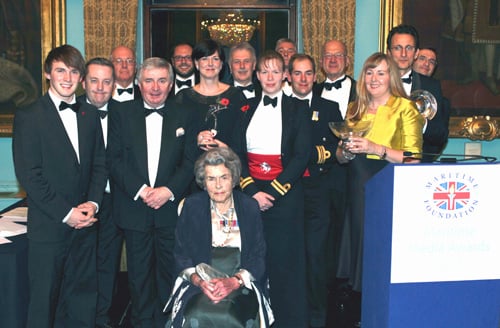 \
\
The awardees in Pall Mall
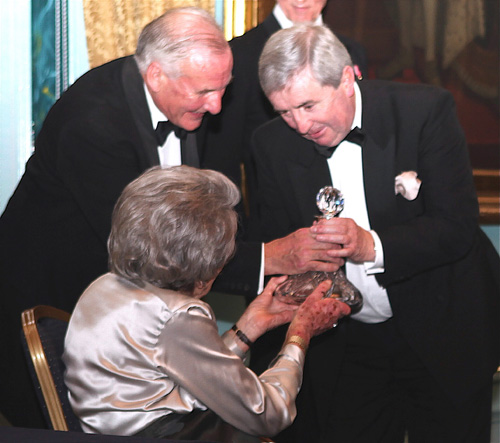
Tom MacSweeney receives the award from Countess Mountbatten
Read Tom MacSweeney's weekly 'Island Nation' blog HERE
Living Beyond Our Means
That is not a title referring to the current economic situation, though it is certainly apt in that regard. I am using it to refer to the fact that as humans we live on relatively small pockets of land on this planet that is dominated by the oceans upon which we depend for life. So much damage is being done to those oceans that 600 marine scientists this week issued a sombre warning:
"It is well past the time to get serious about measuring what is happening to the seas around us."
I was looking this week at an interesting sight, an image of the Earth taken from outer space in which our planet appears as a globe, dominated by a huge drape of blue hues broken up by irregular patches of brown and green, with swirls of grey and white above them. The blue are the oceans, the patches of brown and green the land and the swirls of grey and white the clouds. It made me think that, if life had evolved on another planet and scientists from there were looking at Earth, they would see it as a water planet, dominated by the oceans which cover over 70 per cent of its outer surface.
The oceans are what set Earth apart from other planets in the solar system. They contain over 324,126 cubic miles of water, an enormous quantity of liquid upon which life on the planet depends. We humans, who lack the ability to live totally in water, who do not possess the gills with which marine life is equipped, who are land-bound, air-breathing organisms, have forgotten how unrepresentative is our perspective of land in relation to the oceans. They occupy two-thirds of the world on which we humans live and which we believe was made for us. Yet, there is much more life in the seas. Isn't that an interesting thought, particularly as human life continues to abuse the oceans?
POGO is an organisation linking 80 per cent of the world's institutions studying the oceans. The "Partnership for Observation of the Global Oceans" was created by leaders of the world's major oceanographic institutions. One of its major aims is to reach out to the public, creating more awareness of the seas. It has now established 'Oceans United,' an international forum intended to become 'The Voice of the Oceans,' sharing observations, knowledge and information for the benefit of humanity which depends for its continued existence on the survival of the oceans.
The 600 marine scientists who issued that sombre warning are members of 'Oceans United.' They have called for an integrated global ocean observation system which would monitor the entire ocean surface:
"The situation is that serious. Every country in the world needs to unite, irrespective of their differences, because the ocean surface is now more acidic than ever before and this will affect life on our planet."
The danger from this rising trend is that it will affect the basis of life in the sea – the plankton which are at the base of the global marine food chain. This is not a remote, ethereal issue. Scientists are concerned that the origins of recent world catastrophes such as the floods in Pakistan and summer heat waves and forest fires could be traceable to effects on the oceans as they grow saltier, hotter, more acidic and thus less biologically diverse.
• This article is reprinted by permission of the EVENING ECHO newspaper, Cork , where Tom MacSweeney writes maritime columns twice weekly. Evening Echo website: www.eecho.ie
Mindless Destruction on my 'Lady of the Water'
I am in a somewhat depressed mood writing this week’s column. On Sunday afternoon I boarded my boat on its mooring near the Royal Cork Yacht Club in Crosshaven and what I saw destroyed memories of a pleasant summer sailing season. SEASCAPES had been attacked by thieves and vandalised inside.
It is depressing to think that a group of thieves sat inside my boat for some time. Not satisfied with stealing electronic and other equipment, a plotter, binoculars, flares, even personal items such as sunglasses, sailing hats, gloves, they smashed bulkhead equipment which they could not remove. A barometer and clock were destroyed, adding to the damage caused when the cabin door was broken open.
I can understand how people feel when their homes have been vandalised. This was my “home on the water” during the summer when we sailed along the West Cork coastline. Now it has been defiled by unknown people by persons who must have some boating experience, some maritime knowledge, because they had to use a boat of their own to get onto mine.
Are they amongst the “family of the sea” about which I have written and spoken so often? How can people who have any affinity with the sea do so much damage to a vessel of the sea, I ask myself.
I feel sorry for the boat, that she was undefended against those who attacked her. I feel responsible for what she has suffered, because I was not there to help her as she helped me through many experiences, through bad weather and testing times. These thoughts that come to mind in what I know is a useless raging inside me, but I feel hurt, upset, angry, emotions that are mixed as I write. It is possible to understand theft, but it is very hard to accept mindless vandalism against my undefended ‘lady of the water’ with whom I have shared so much time and energy in moments of joy and of sadness, who looked after me as I slept aboard when she swung to her anchor in coastal harbours.
It was only last week that the Irish Sailing Association warned that thieves were targeting boats and marine equipment. Take care of yours. I have notified the Gardai and they are investigating.
This shall not dissuade me, depressed as I am this week.
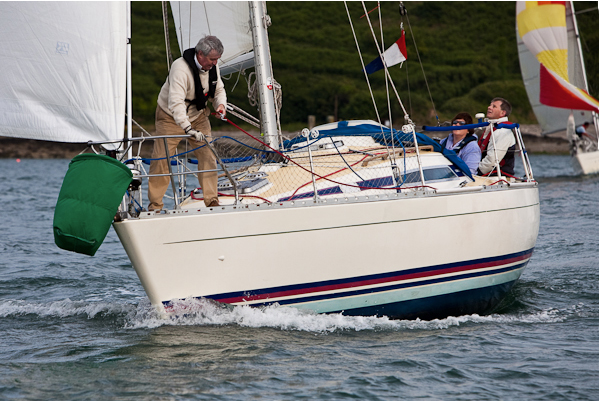
Seascapes - vandalised on her moorings in Cork harbour. Photo: Bob Bateman
• This article is reprinted by permission of the EVENING ECHO newspaper, Cork , where Tom MacSweeney writes maritime columns twice weekly. Evening Echo website: www.eecho.ie
More Irish International Success
It is great to report more Irish success on the world sailing scene, where our sailors have done well this season, lifting the country’s reputation internationally.
SCHULL will stage the Youth World Team Racing Championships next year, which is a huge international recognition of Irish ability at organisational, as well as performance level, while a Kinsale Yacht Club team has won a top international regatta.
The decision by the world sailing authority, the International Sailing Federation, to award the team racing event to the West Cork village is a strong international recognition of the achievements of the Fastnet Marine and Outdoor Education Centre which was established at Schull Community College in 1997. The event will be raced in TR 3.6 dinghies, a one-design boat purpose-built for team racing, sailed by a crew of two. Organisational work is underway at Schull and a formal announcement of plans for the event will be made next month. It is expected to cost up to €200,000 to stage. At least 20 teams from around the world will take part.
This is also a boost for youth sailing and for team and match racing which have been increasing in popularity amongst younger sailors. The Irish Sailing Association’s Women’s Match Racing Championships were held at Kinsale Yacht Club last weekend and were won by a team led by Laura Dillon from Howth YC. The next match racing event will be the ISA’s Open Championships also to be staged at Kinsale, where racing will be from the 23rd to 25th of this month. It is approved by the International Sailing Federation as a Grade 3 event which gives world rankings to Irish competitors.
The annual general meeting of Match Racing Ireland, which has been given formal recognition by the Irish Sailing Association, will be held in Kinsale YC on October 23. In conjunction with the championships, members of the association will review progress made in developing match racing.
CIT Cork won the Student National Championships sailed at the RCYC, qualifying them for the Student World Cup next year. Six college teams took part. The team was skippered by George Kennefick.
Olaf Sorensen from Kinsale Yacht Club, crewed by Martin Payne and Shawn Kingston achieved another international success for Ireland at Saint Tropez in the 2010 Dragon Regatta, winning the eight-race highly-competitive event. It was sailed over two days during which the 48-boat fleet, drawn from several countries, faced a wide variety of wind and sea conditions.
Sailing Dragon IRL 207 “Christianna” in a competitive fleet where there was little separation amongst the top boats, the Kinsale crew held the lead after the first day of racing, closely followed by two Russian boats. In the final day’s racing, with winds of up to 25 knots and big seas, they held onto their position to take the event overall, with Russia second and France in third place, securing another Irish win on the international scene.
Irish sailors have had some great victories overseas this season, lifting the reputation of the country.
-
This article is reprinted by permission of the EVENING ECHO of Cork where Tom MacSweeney writes maritime columns twice weekly. Evening Echo website: www.eecho.ie



























